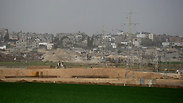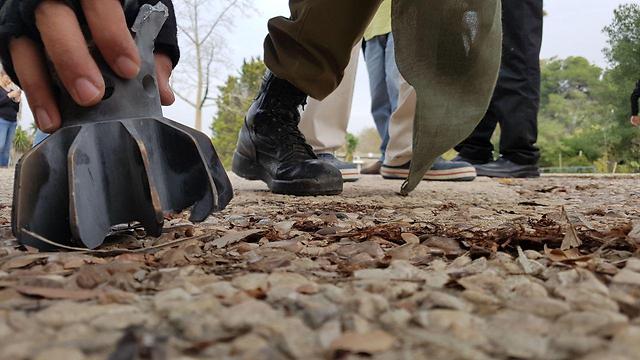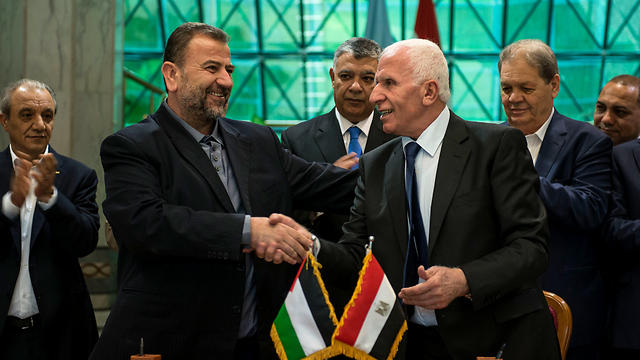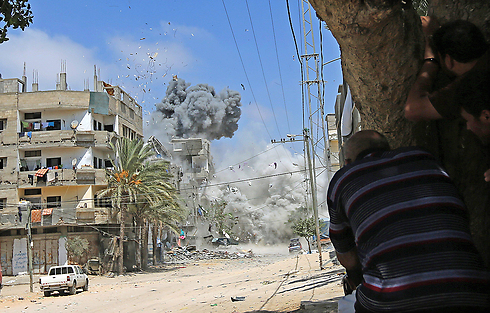
The Israeli-Gaza border
צילום: רועי עידן
The creative score-settling that may lead to Gaza war
Op-ed: Rocket fire at Israeli communities on Gaza's perimeter are the Palestinian Islamic Jihad's attempt to retaliate for the destruction of its terror tunnels and to sow fear among Israelis; PIJ also seeks to placate its Iranian overlords, wishing to draw attention away from protests; failed Palestinian reconciliation and blockade may push Hamas to allow PIJ to deteriorate situation to all-out conflict, an eventuality Israel is desperately seeking to delay.
The Palestinian Islamic Jihad found a creative way to settle its score with the State of Israel over the destruction of its cross-border terror tunnel.



Instead of one major attack that would claim many Israeli victims, the organization is claiming its revenge by increasing the sense of insecurity and fear among Israelis residing on the Gaza perimeter by firing rockets and mortar shells.
According to Islamic Jihad's estimates, this ongoing psychological warfare through a "drizzle" of rockets won't justify a wide-scale Israeli operation in the Gaza Strip in retaliation.

Islamic Jihad is using rocket fire at Gaza perimeter communities to get back at Israel for destruction of its tunnels (צילום: רועי עידן)
In light of the pressure it is facing from Hamas and the Egyptians not to carry out a major act of revenge, this creative way of stressing the Israelis out is almost an ideal solution as far as the organization is concerned. More importantly, this type of revenge is unlikely to get the strip embroiled in another IDF operation, which would inflict a lot of damage and leave many victims on the Palestinian side.
There's no doubt Hamas doesn't approve of this creative method, knowing that a mortar shell or a rocket fired by Islamic Jihad could eventually hit a community and claim victims, making it impossible for Israel to keep exercising restraint. Hamas can't, however, disregard Islamic Jihad, which is the second largest organization in the Gaza Strip—both in terms of size and military power—with some 10,000 fighters and collaborators and thousands of rockets and mortar shells.
Hamas likely understands that apart from the need to avenge the tunnel's destruction, Islamic Jihad also needs to satisfy its Iranian patrons.
Iran has a double interest in a major escalation in the strip. First of all, it wishes to divert global attention from the anti-regime protests currently rocking the country, and its own brutal attempts to quash them. Secondly, it wants to thwart any chance of Palestinian cooperation with President Donald Trump administration's plan to solve the Israeli-Palestinian conflict.
All this indicates that the Israelis and the Gazans are already sliding down the slippery slope leading to escalation, and then to a large-scale IDF operation in Gaza. The timing isn't all that clear yet, but the wind is definitely blowing in that direction.
The question of timing
Unlike the situation in Gaza two months ago, Hamas's objections to any escalation—knowing full well it could boomerang right back to it due to local outrage—is slowly eroding.
The chief reason for such erosion is the fact that Palestinian reconciliation between Hamas and the Mahmoud Abbas-led Palestinian Authority is mired deeply in mud. For the same reason, the strip has no power or salaries for civilian administrators.
The heart of the conflict has been and continues to be Hamas's security force and its military wing, which the Islamic organization refuses to disband. Another reason for Hamas's feeling of malcontent is that the Egyptians, despite the organization's gestures of subservience and conciliation, refuse to open the Rafah Border Crossing. The Palestinians in Gaza remain essentially imprisoned in a gigantic detention camp.

Stalled Palestinian reconciliation may push Hamas to allow Islamic Jihad to deteriorate situation to all-out conflict (צילום: EPA)
Hamas may therefore soon reach the conclusion the best possible route of action is to allow the Islamic Jihad to deteriorate the situation to large-scale escalation that will stack the deck anew, and allow Hamas to receive from Egypt, Abbas and Israel what it could not achieve through concessions.
At face value, Israel also has a good enough reason to undertake a large-scale campaign in Gaza, contrary to recent statements by both politicians and army brass. It would not only mend deterrence, long since eroded, but also allow the IDF to operate in Gaza, something the army is better prepared for than it has ever been at any point in the past decade.
Israel would thus be able to take the initiative itself, while Hamas and the Islamic Jihad are not yet wholly prepared for conflict, and the tunnel threat being severely hampered over the past several months.
The claim as if Israel would not wish to disrupt works on the underground anti-tunnel barrier project has lost some validity. While a Gaza operation will indeed set back works on the barrier by several months, the army is not likely to have to utilize the stringent security measurers it does today for the project once that operation is concluded.
Delaying work on the project or any damages caused to its installations will be ancillary, then. What is far more majorly problematic, however, and the reason behind the political and military ranks' refusal to operate in Gaza, is the fact that at the conclusion of any such operation Israel still has no desire to remain in Gaza, and so the IDF will pull out, as usual, and the situation will eventually return to normal, as usual.

The IDF may carry out another Gaza operation, but things will eventually return to the status quo as it will pull out when it concludes (צילום: EPA)
The situation will return to normal, then, notwithstanding Israeli casualties, physical damages and disruption of ordinary life for a few weeks. This feeling, then, that after every Gaza operation we end up returning to square one, is the chief reason behind the IDF delaying any such operation, despite its ability to carry it out successfully.
The political-strategic problem posed by Gaza's mere existence as a separate entity also lacks a good, or actually any, solution. While the IDF can take back the strip, the duration will always be limited and, as mentioned above, things will return to the status quo in short order.
Moreover, even undertaking quite the opposite dramatic move, to improve humanitarian conditions for Gaza's populace, will achieve nothing. After all, the Palestinian Islamic Jihad, so considerable in its military might, operates according to an Iranian agenda and thinks little of the welfare of Gaza's citizenry. Otherwise, Hamas would have long since reached an Egyptian-mediated settlement with Israel.
In conclusion, it may be said that under current conditions, unfortunately, there is nothing new in the State of Israel's southwest.












